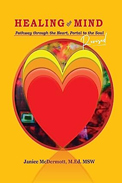
 |
A confessional and vulnerable work, McDermott’s book opens with the author’s insights about facing death and processing grief. Like Thoreau, she rekindled a relationship with nature and gained invaluable insights about herself via the act of walking. These reconnections created paths to other philosophical gateways. The narrative carefully explores what it means to be a nurturer, and it encourages readers to make their own paths and changes. The book also gives an overview of what it means to become and be an encouraging, supportive nurturer to others. Additionally, readers learn what it means to gain trust from others and how to recognize those they can trust in return. As the book concludes, it introduces the concept of The Divine Child, which encourages readers to pay attention to their conscience and balance it with the demands of honesty and adulthood.
Reading this book is like walking an illuminated path to spiritual enlightenment. It encourages readers to find their inner voices, tune into them, and listen to them in order to lead a more meaningful life. One of the book’s most poignant moments is its discussion about childhood wounds. This portion examines how childhood wounds lead to an adult’s inability to express themselves. It also explores how those wounds can disconnect an individual from their integrity and self-value and have negative health consequences. Readers seeking a book about mindfulness rooted in nature’s healing will resonate with this book. Meanwhile, those looking for a unique way to transform their lives for the better will appreciate it, too.